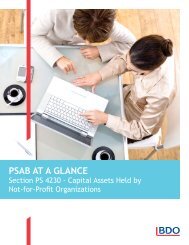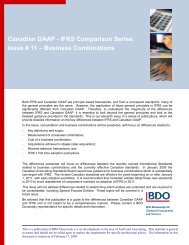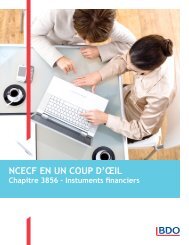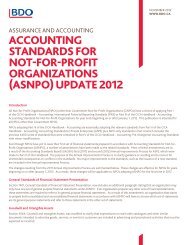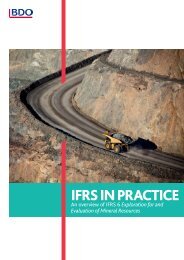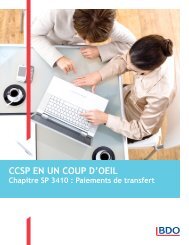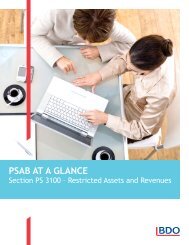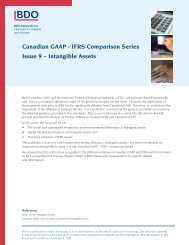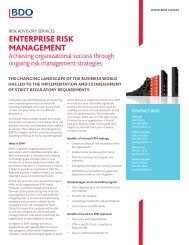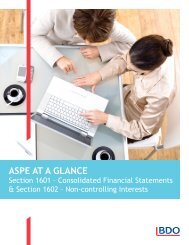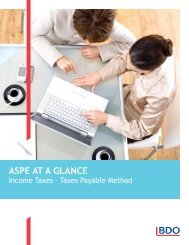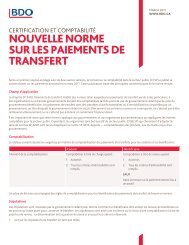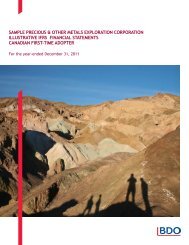Need to Know: IFRS 10 - Consolidated Financial ... - BDO Canada
Need to Know: IFRS 10 - Consolidated Financial ... - BDO Canada
Need to Know: IFRS 10 - Consolidated Financial ... - BDO Canada
- No tags were found...
You also want an ePaper? Increase the reach of your titles
YUMPU automatically turns print PDFs into web optimized ePapers that Google loves.
<strong>IFRS</strong> <strong>10</strong> <strong>Consolidated</strong> <strong>Financial</strong> Statements19The example below illustrates how the ‘exercisable’ criteria is applied.Example 3 – Exercisable substantive rights [<strong>IFRS</strong> <strong>10</strong>.B24 Application Example 2]Company A (the investee) is controlled through equity share voting rights.It has annual shareholder meetings at which decisions <strong>to</strong> direct the relevant activities are made. The nextshareholders’ meeting is scheduled in eight months. However, shareholders that individually or collectively hold atleast 5% of the voting rights can call a special meeting <strong>to</strong> change the existing policies over the relevant activities,but a requirement <strong>to</strong> give notice <strong>to</strong> the other shareholders means that such a meeting cannot be held for at least30 days.Policies over the relevant activities can be changed only at special or scheduled shareholders’ meetings. Thisincludes the approval of material sales of assets as well as the making or disposing of significant investments.Scenario 1An inves<strong>to</strong>r (Company X) holds a majority of the voting rights in Company A.Company X’s voting rights are substantive because X is able <strong>to</strong> make decisions about the direction of the relevantactivities when they need <strong>to</strong> be made.The fact that it takes 30 days before Company X can exercise its voting rights does not s<strong>to</strong>p it having power.Company X has both the practical ability <strong>to</strong> exercise its rights and those are exercisable when decision about thedirection of relevant activated need <strong>to</strong> be made.Scenario 2An inves<strong>to</strong>r (Company Y) holds an option <strong>to</strong> acquire the majority of shares in Company A. The option isexercisable in 25 days and is deeply in the money.Company Y has rights that are essentially equivalent <strong>to</strong> the majority shareholder (Company X) in Scenario 1.Company Y can make decisions about the direction of the relevant activities when they need <strong>to</strong> be made asthe option is exercisable within 25 days which is before a meeting could be convened (30 days). So the existingshareholders are unable <strong>to</strong> change the existing policies over the relevant activities. This and the fact that theoption is deeply in the money means it is substantive. It gives Company Y the current ability <strong>to</strong> direct the relevantactivities even before the option is exercised.Scenario 3An inves<strong>to</strong>r (Company Z) is party <strong>to</strong> a forward contract <strong>to</strong> acquire the majority of shares in Company A. Theforward contract’s settlement date is in six months time.Company Z does not have a substantive right at the moment as it does not have the current ability <strong>to</strong> direct therelevant activities. The existing shareholders have the current ability <strong>to</strong> direct the relevant activities because theycan change the existing policies over the relevant activities before the forward contract is settled in six monthstime.However Company Z may conclude that is has control once it gets within 30 days of the settlement date.



